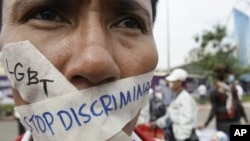Children in Cambodia will receive lessons on LGBT+ issues from 2020 in a bid to wipe out bullying and discrimination in the socially conservative country, an official said on Tuesday.
From grade seven, around age 13, modules covering sexual orientation and gender identity will be part of sex education in schools, said Yung Kunthearith, deputy director of the education ministry’s department of health studies.
“It’s about equality,” he told the Thomson Reuters Foundation. “We want our children to be aware of these issues and know that no one should be discriminated against in school or any part of life.”
Cambodia has no legislation that deals specifically with LGBT+ people. Same sex marriages are neither criminalized nor officially recognized by the state.
While acceptance of LGBT+ people in Cambodia is increasing, one in three report harassment in the workplace, according to research released this week by the Cambodian Center for Human Rights, a non-government organization.
Some are still forced by parents into unwanted marriages or so-called conversion therapy with traditional healers, which aims to make them straight or not transgender, campaigners say.
The new classes would help “cultivate a rights-based mindset so children can exercise their agency to transform discriminatory norms,” said Ryan Silverio, regional coordinator for the ASEAN SOGIE Caucus, an advocacy group.
The move puts Cambodia at the forefront of LGBT+ education in Southeast Asia, with neighboring Thailand the only other nation known to have included such issues in mainstream teaching, he added.
So far, 3,100 Cambodian teachers have been trained to deliver the new material, according to Srun Srorn, an LGBT+ activist who developed the modules with the Education Ministry.
He said that while there was some resistance among “very homophobic” teachers, the program had generally been received with “enthusiasm” and at least five teachers had come out during the training.
“This is a win for us already,” he said, adding that bullying and discrimination was rife among students and teachers.
“We have to start now. In 10, 20 years’ time, the students of today will be business owners, they will be governors ... then we will have change.”








